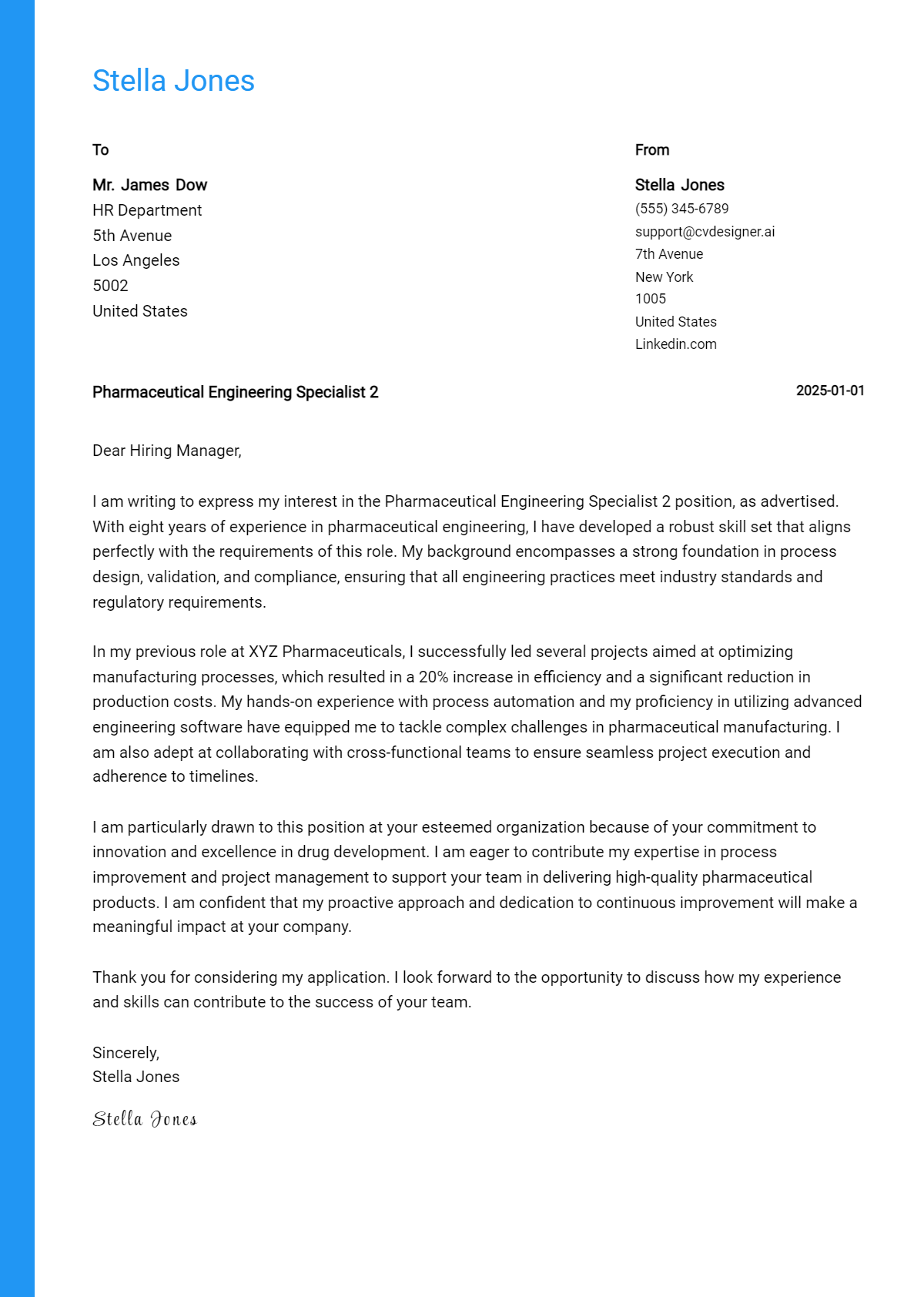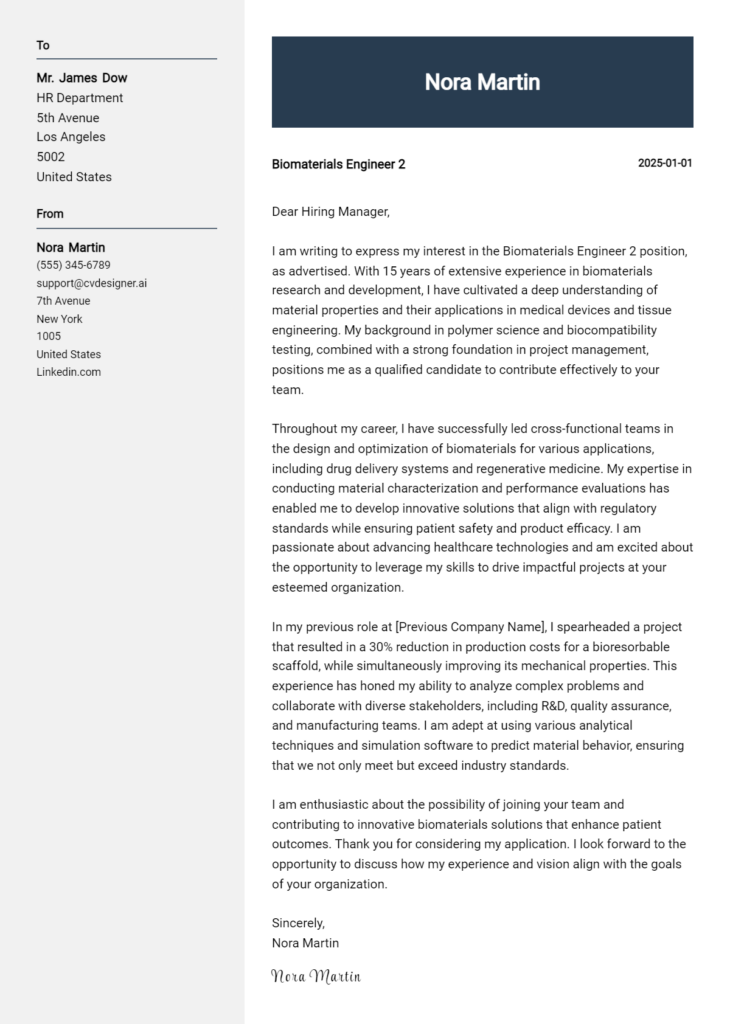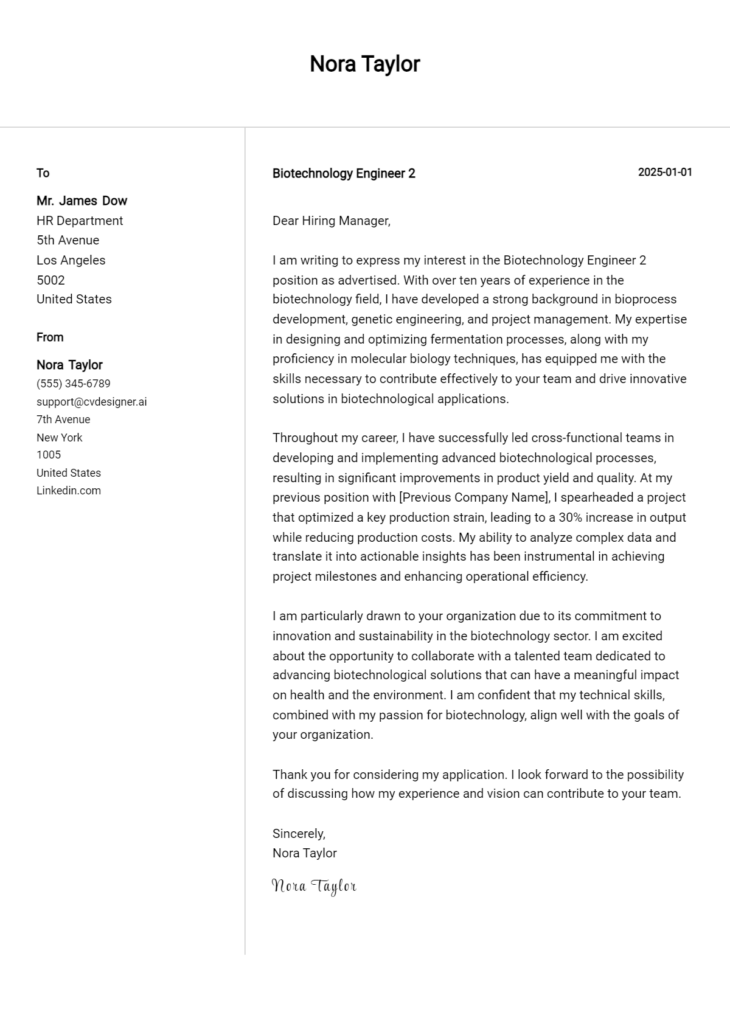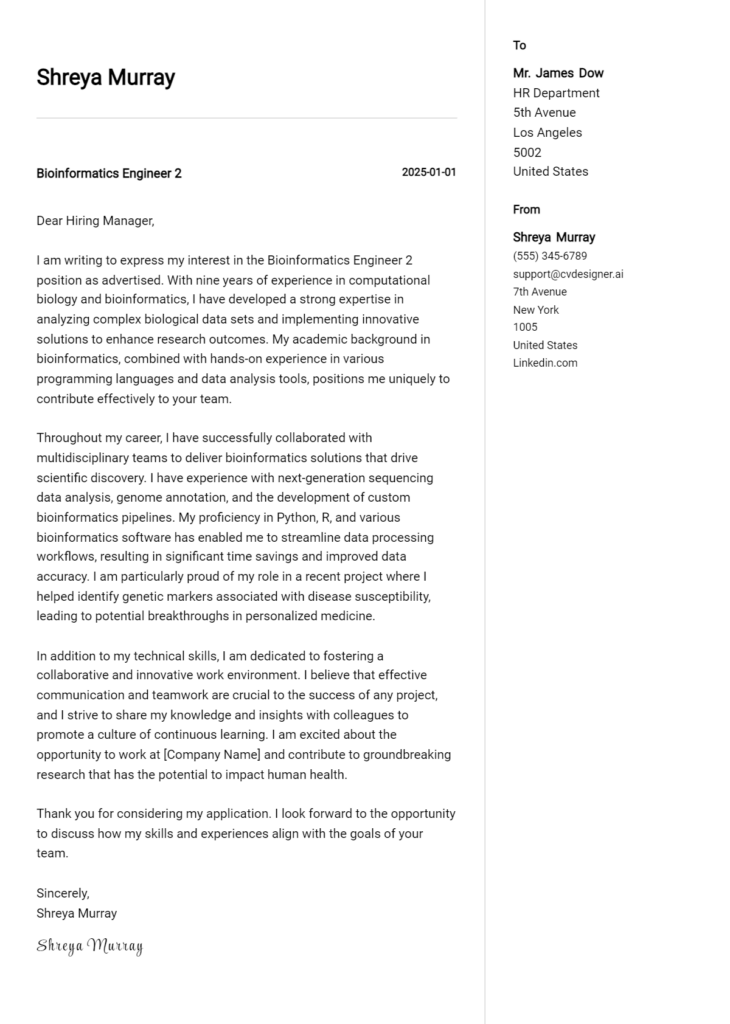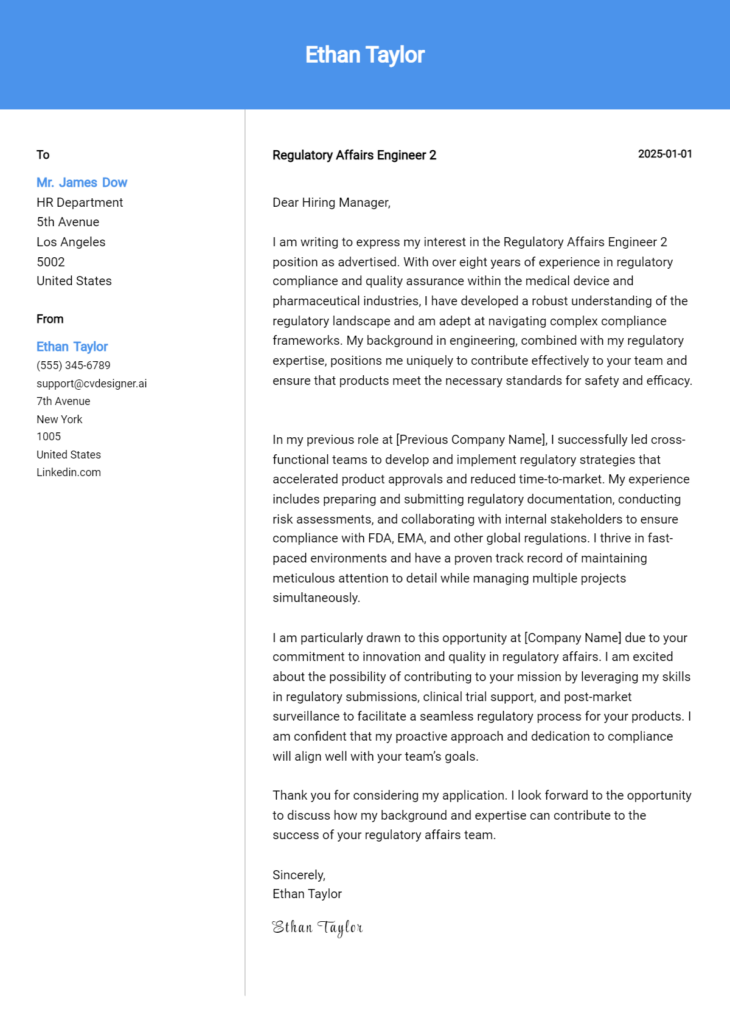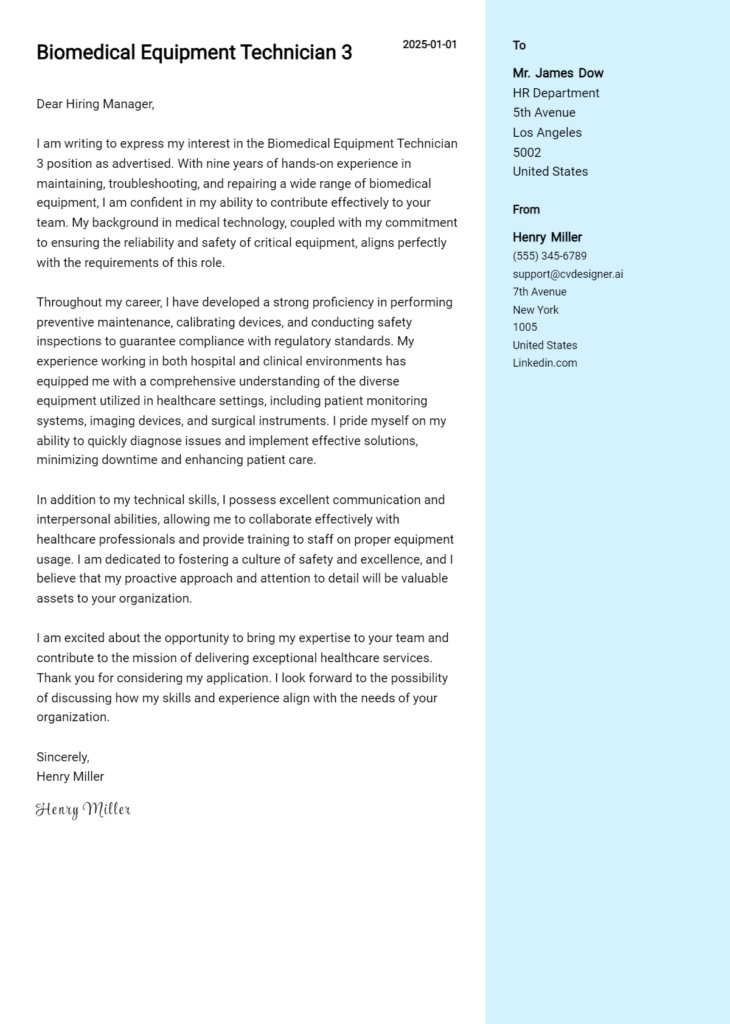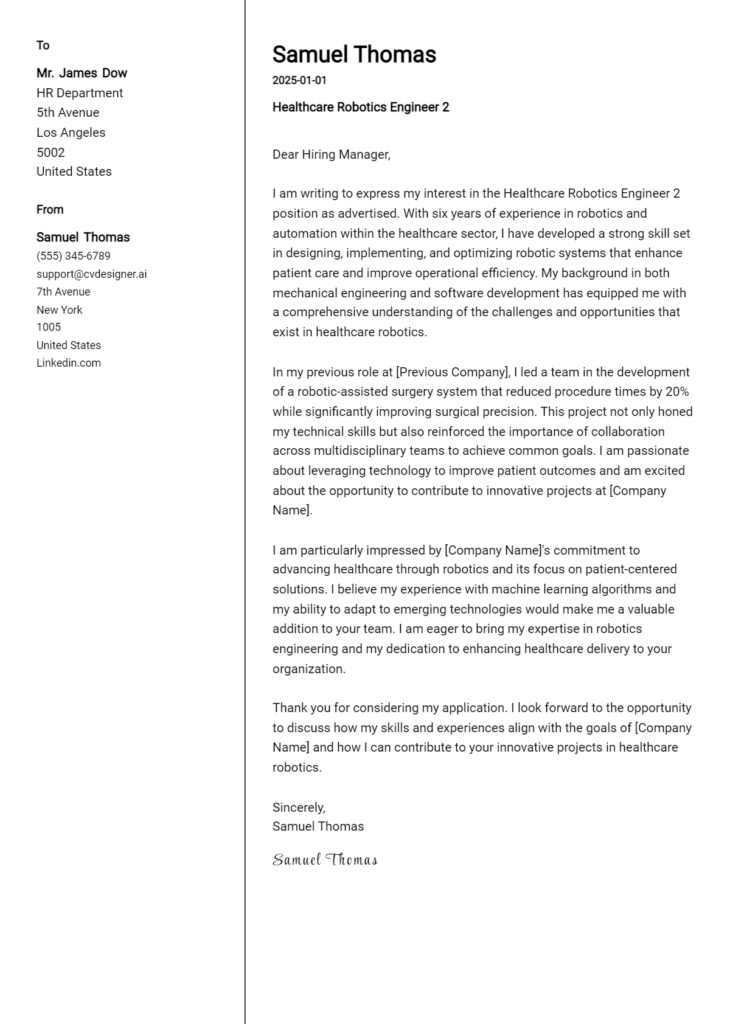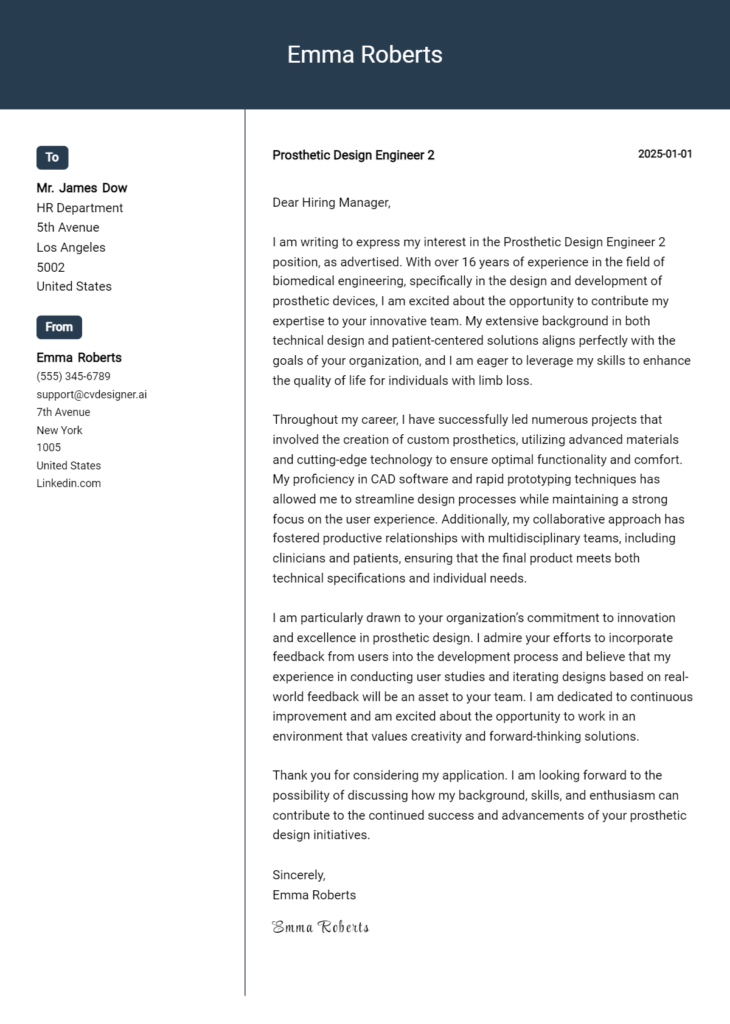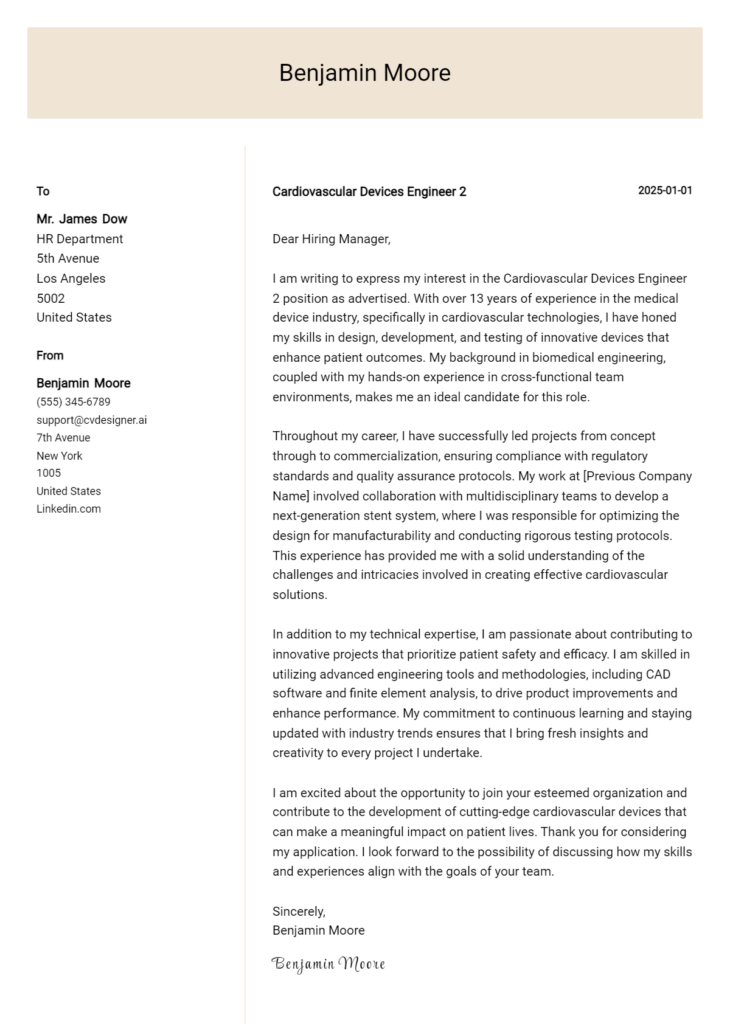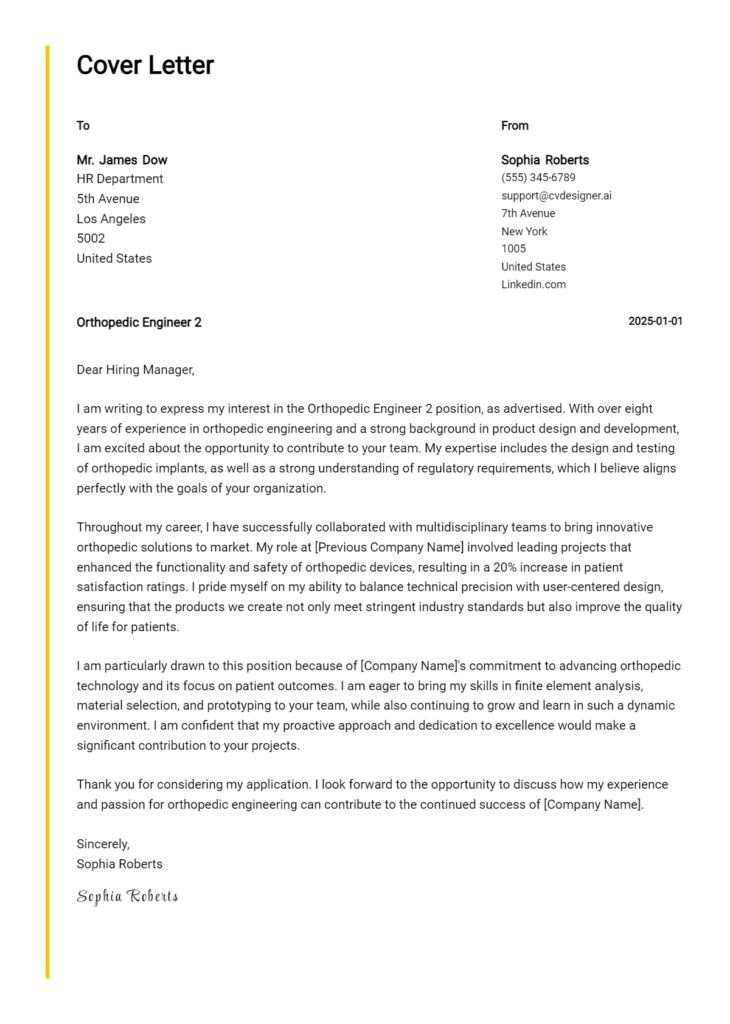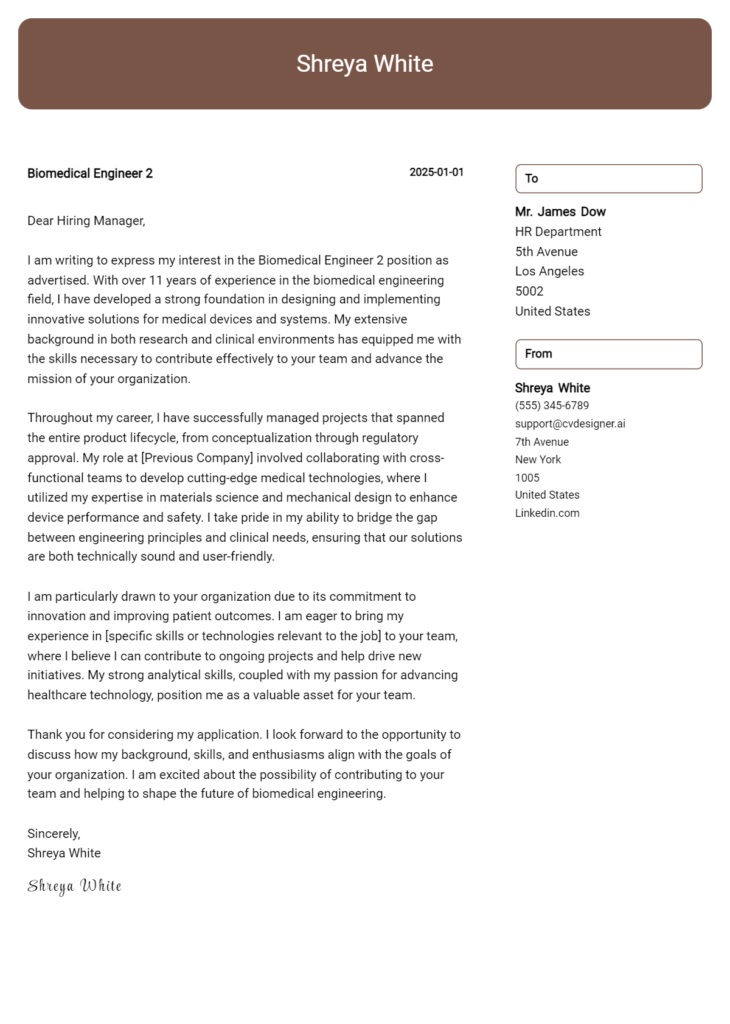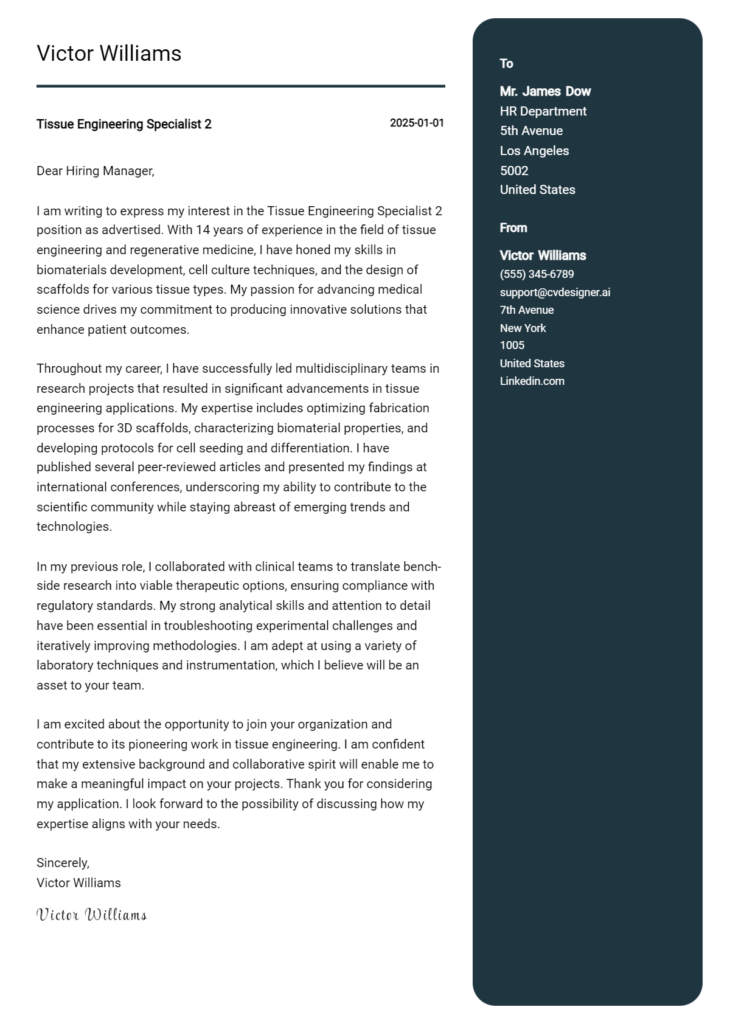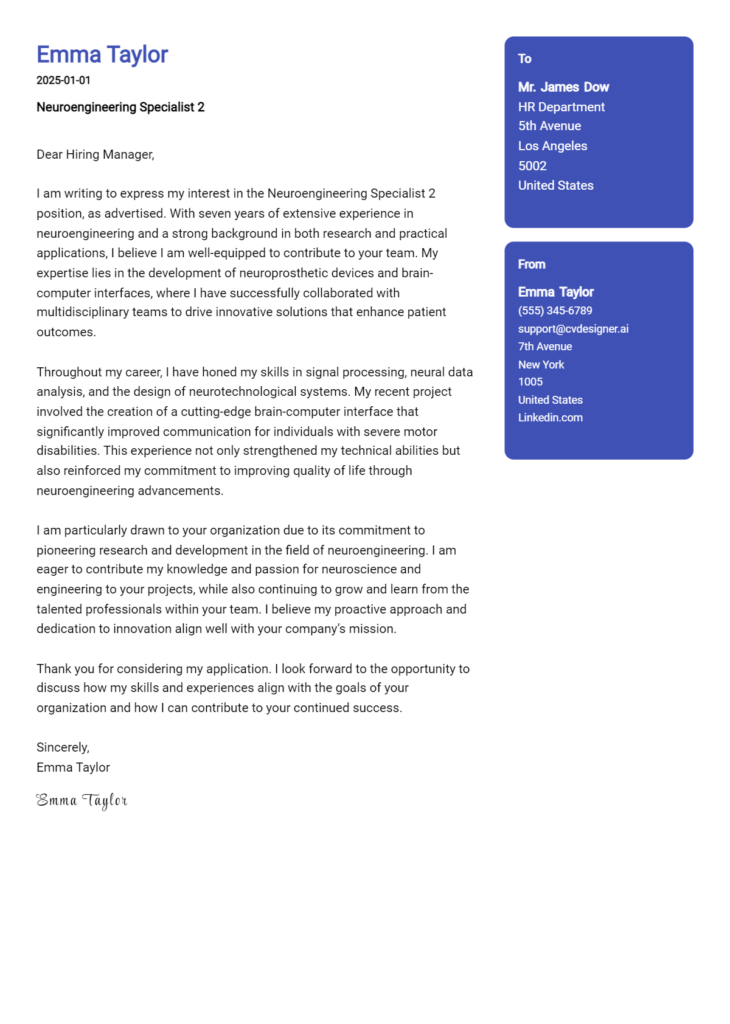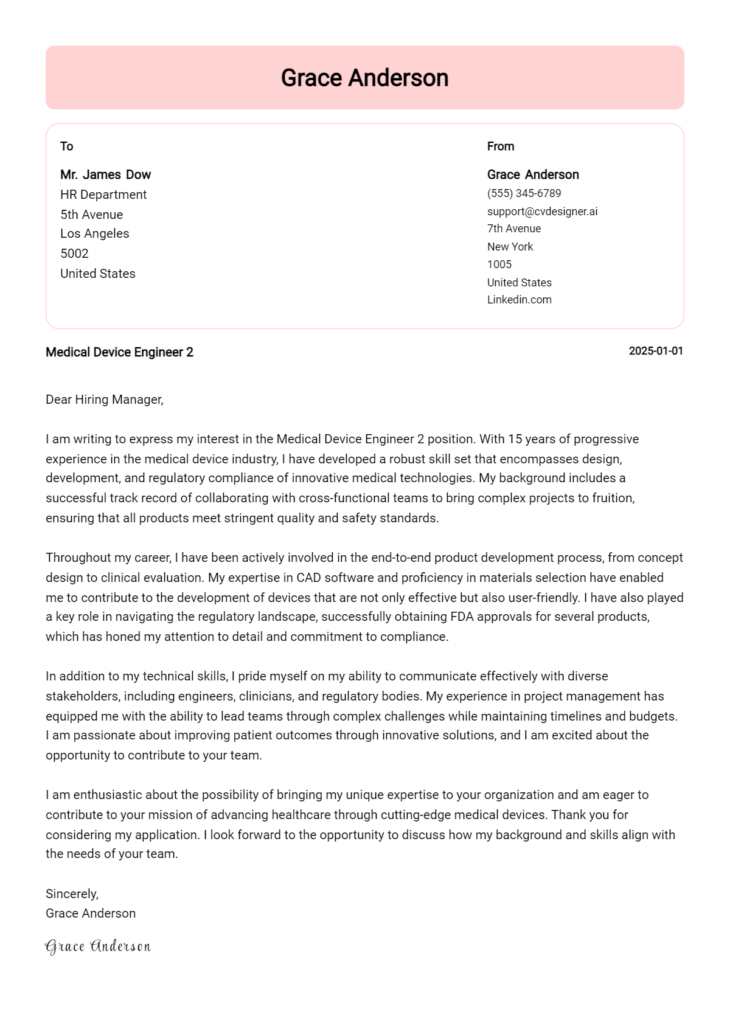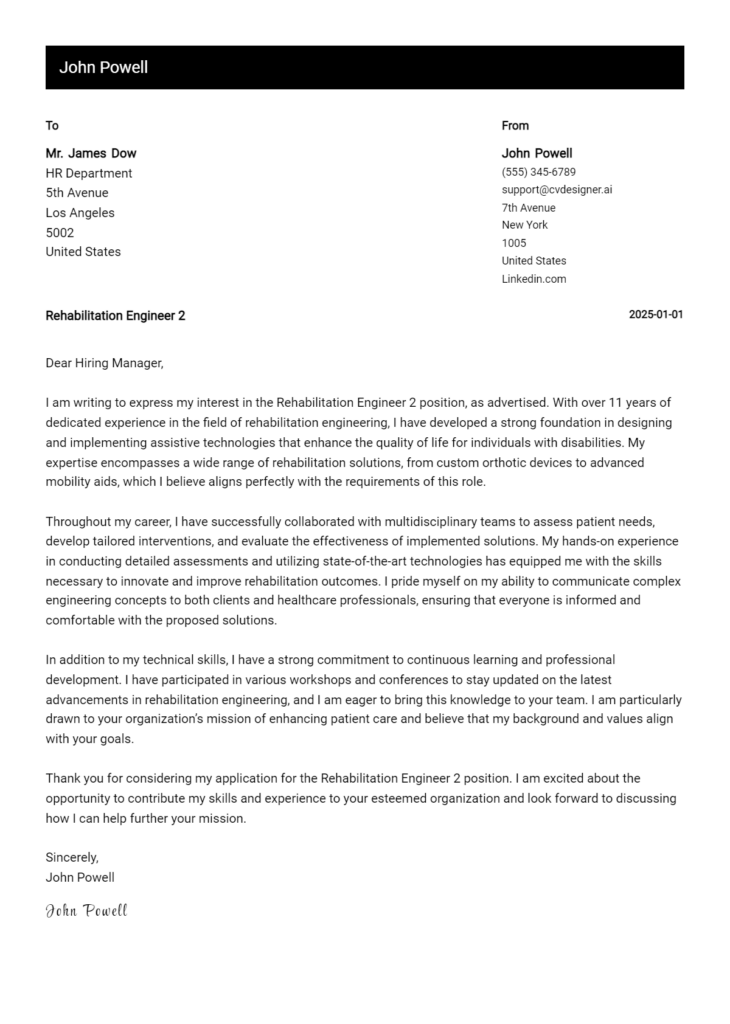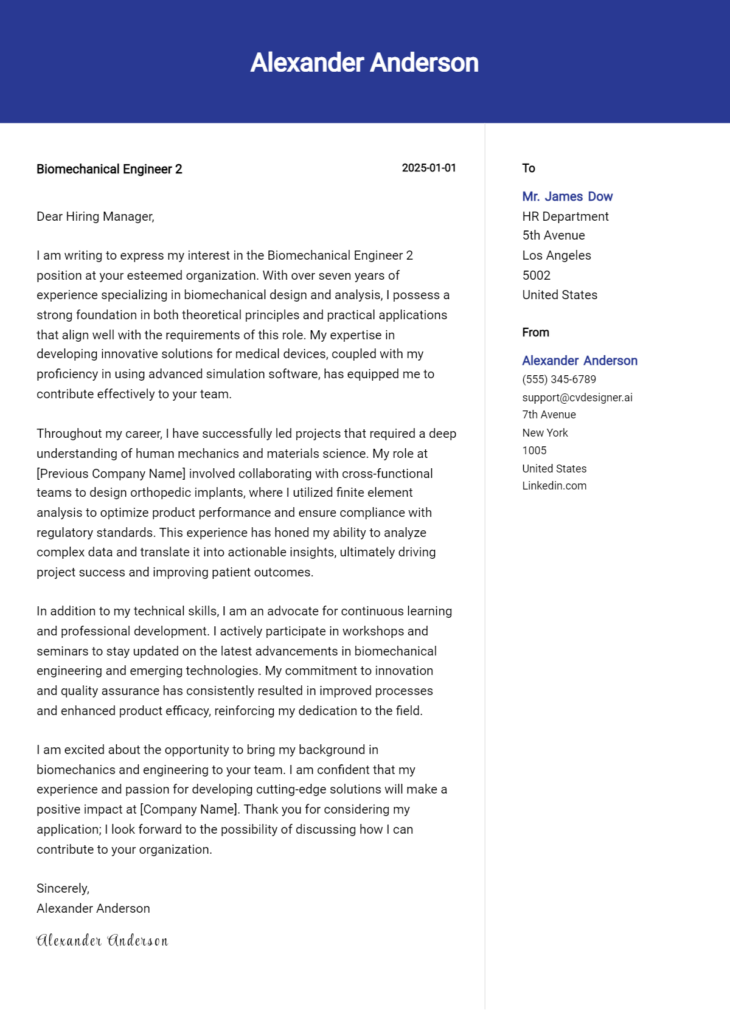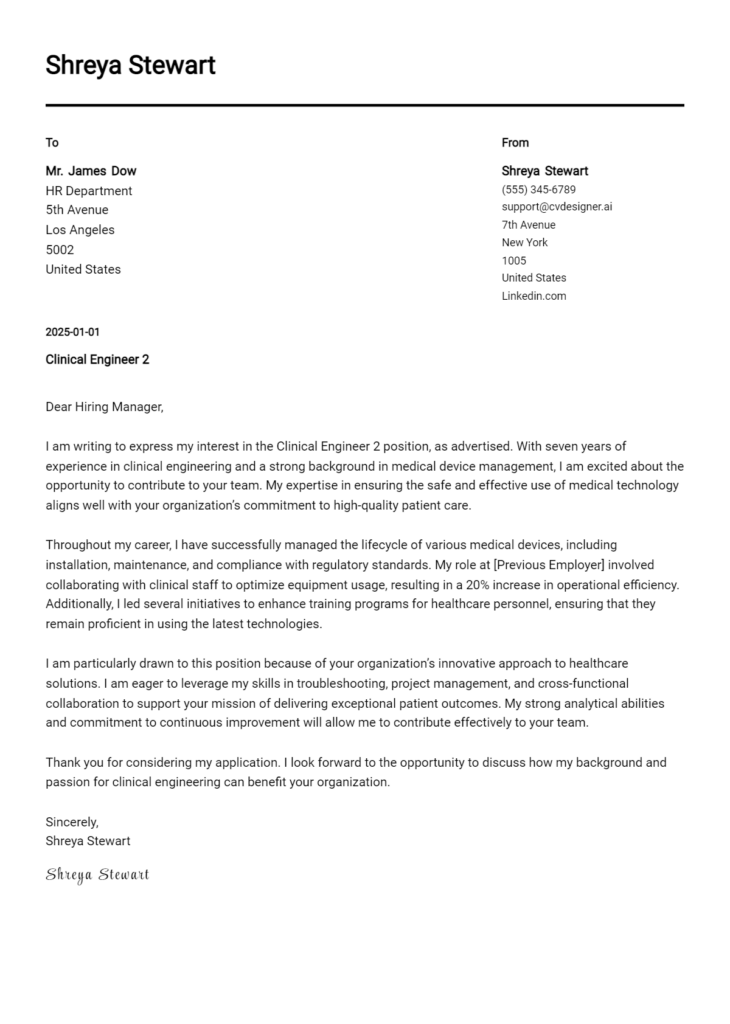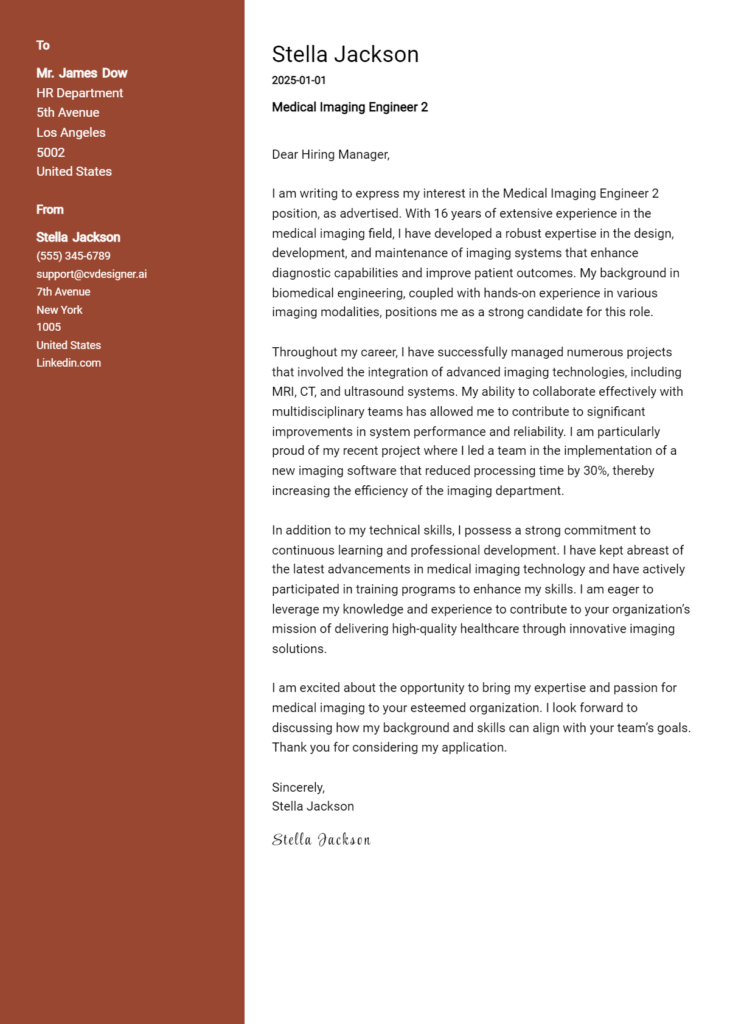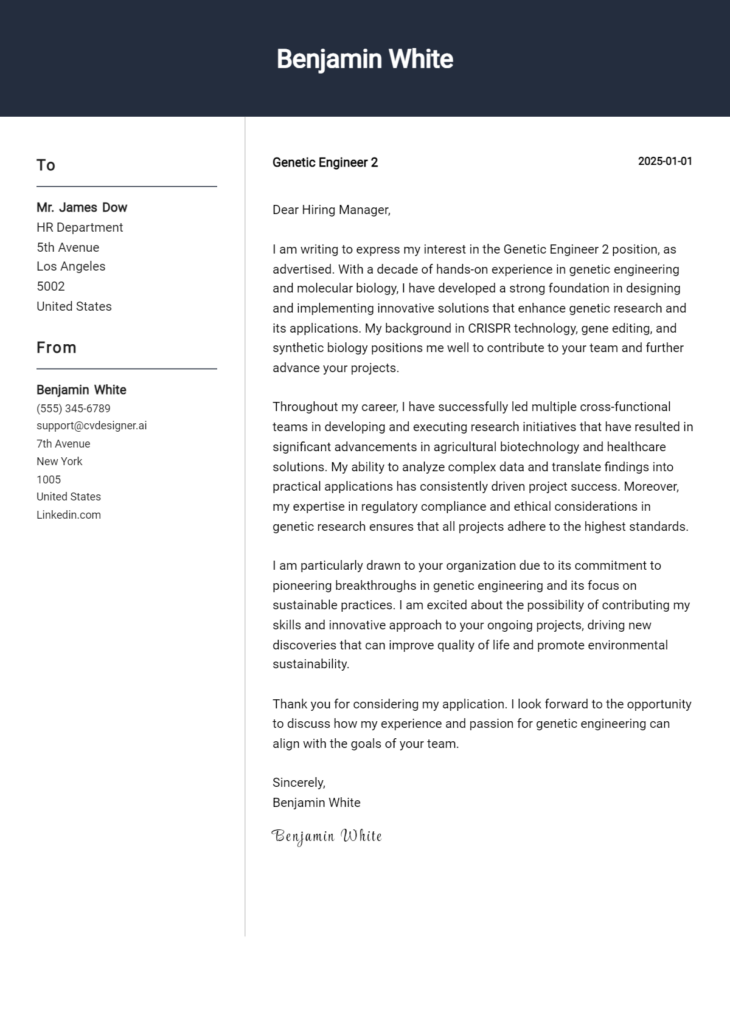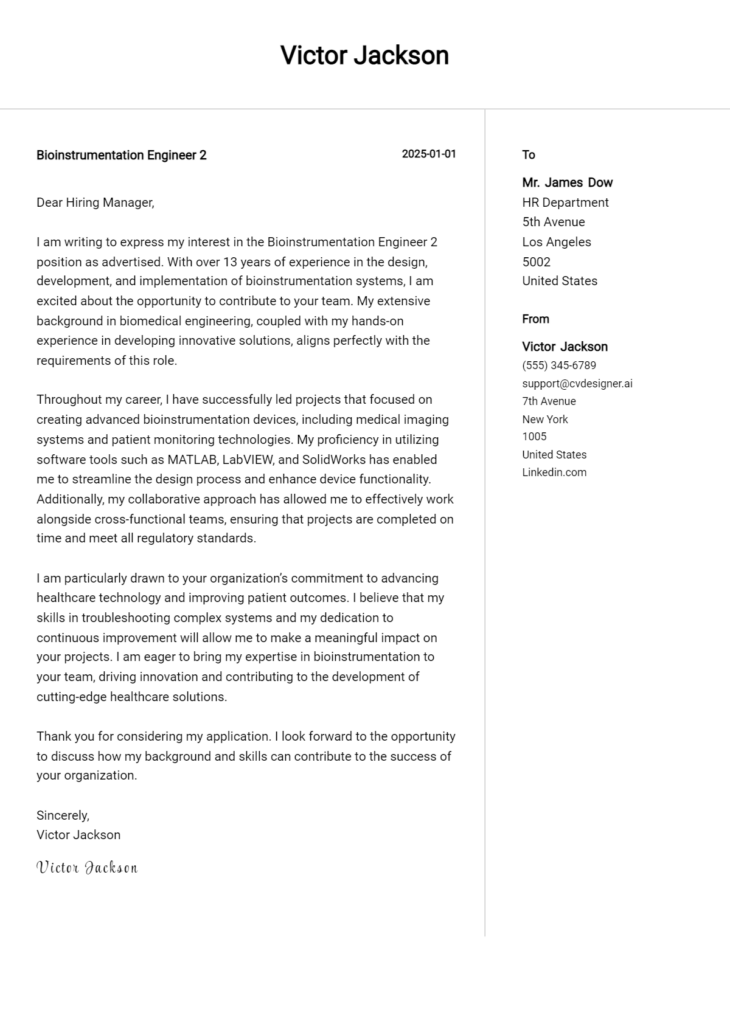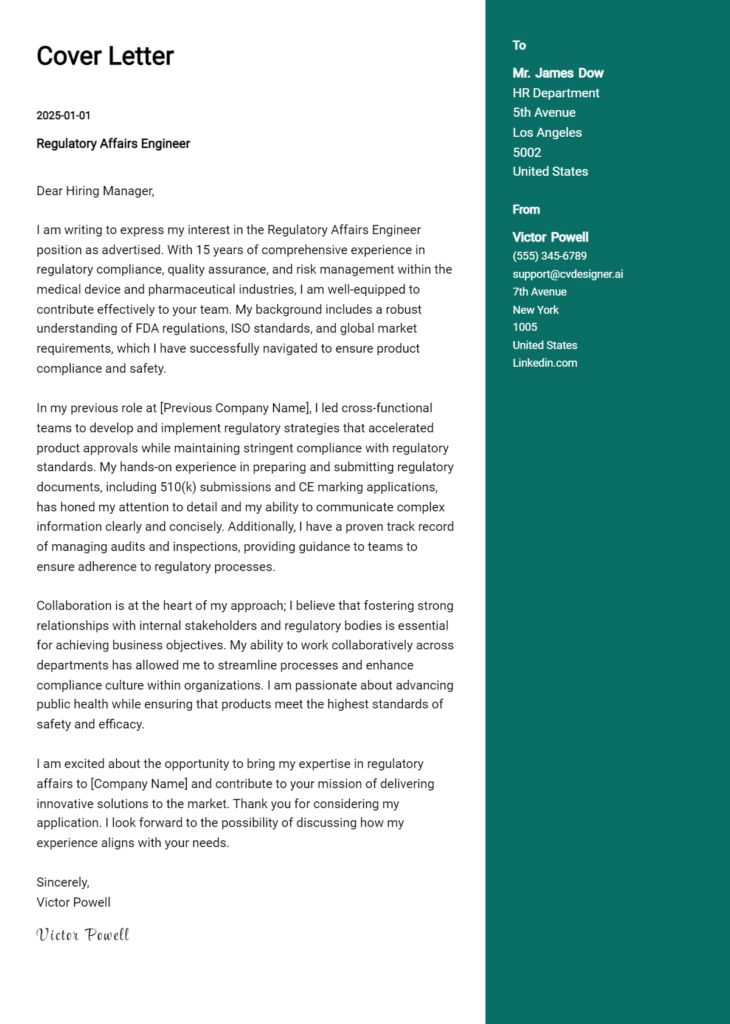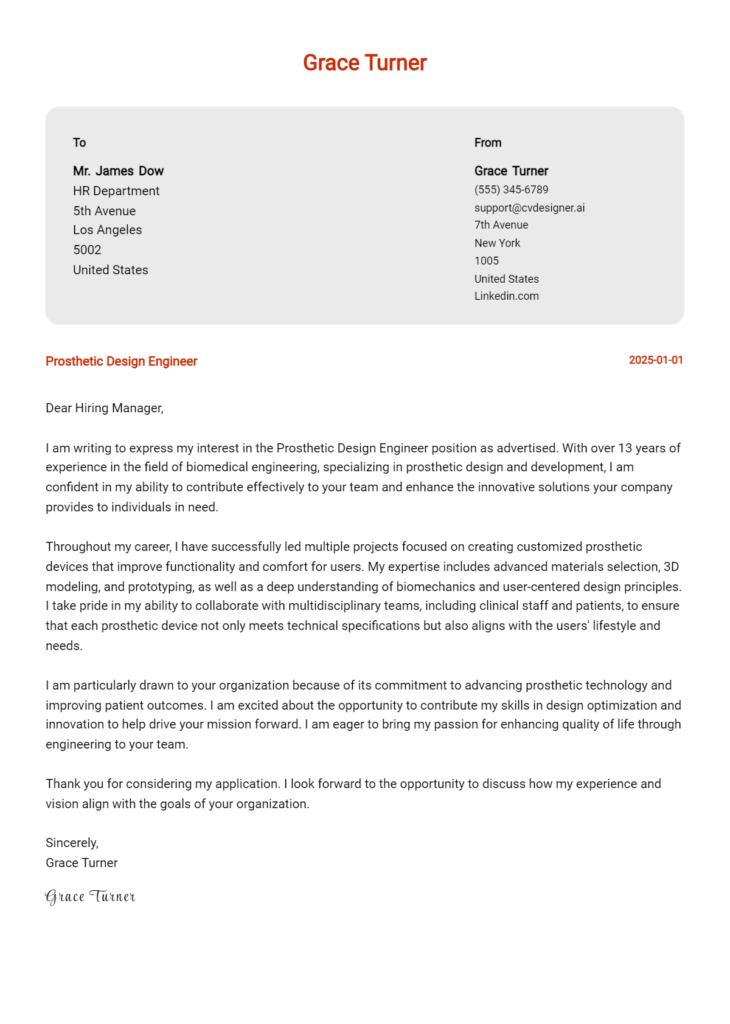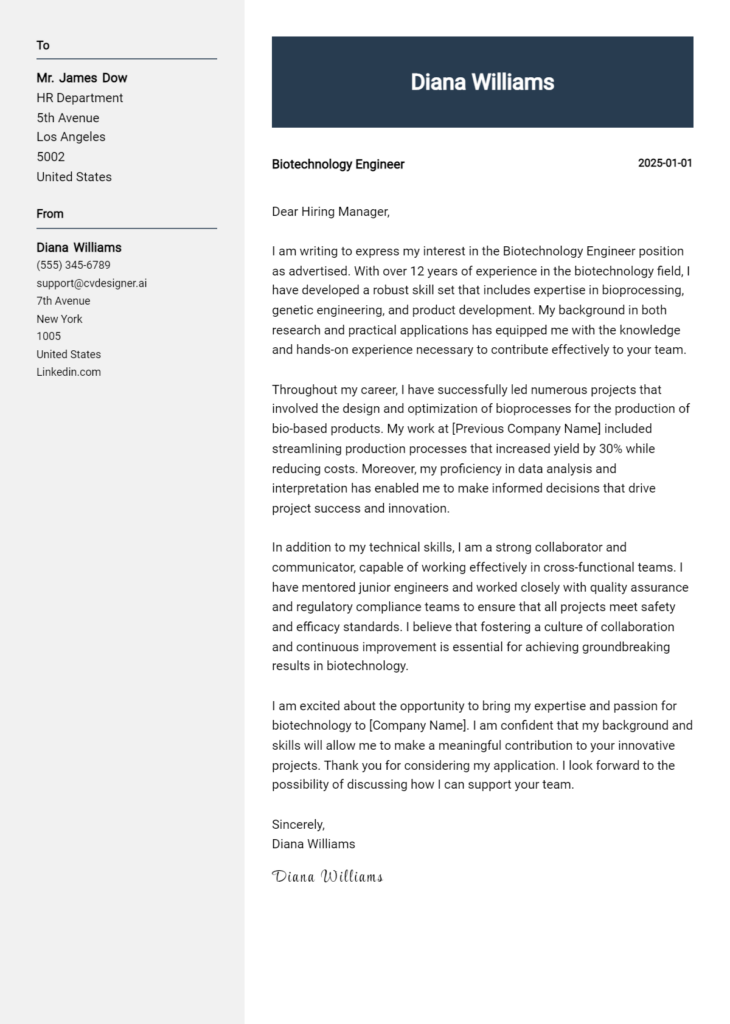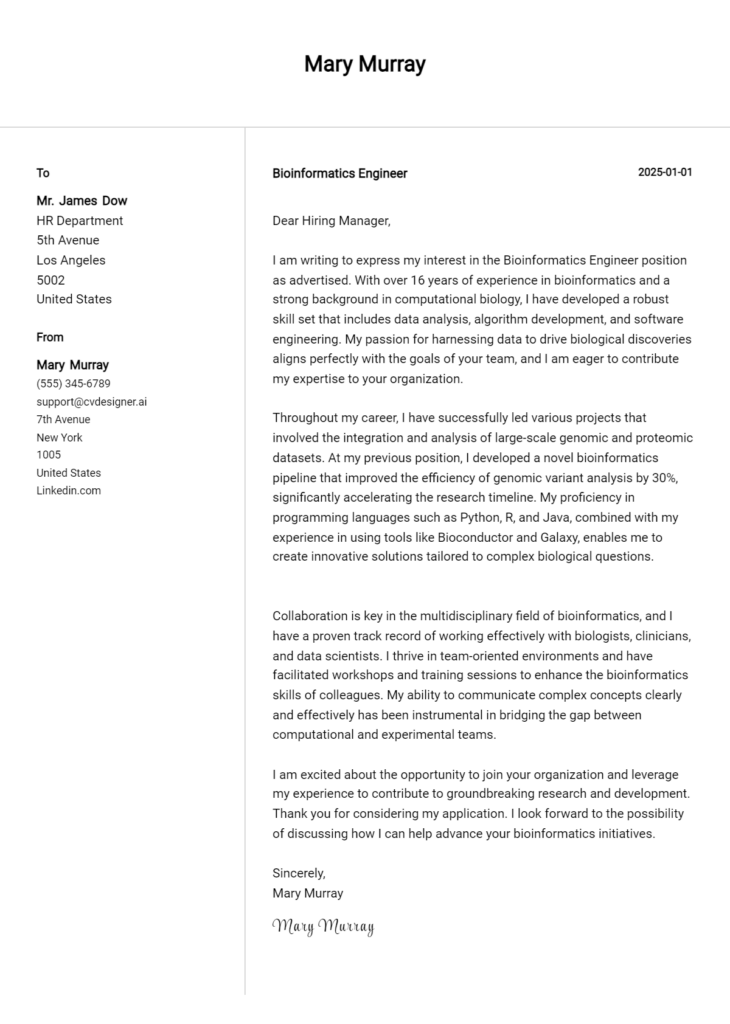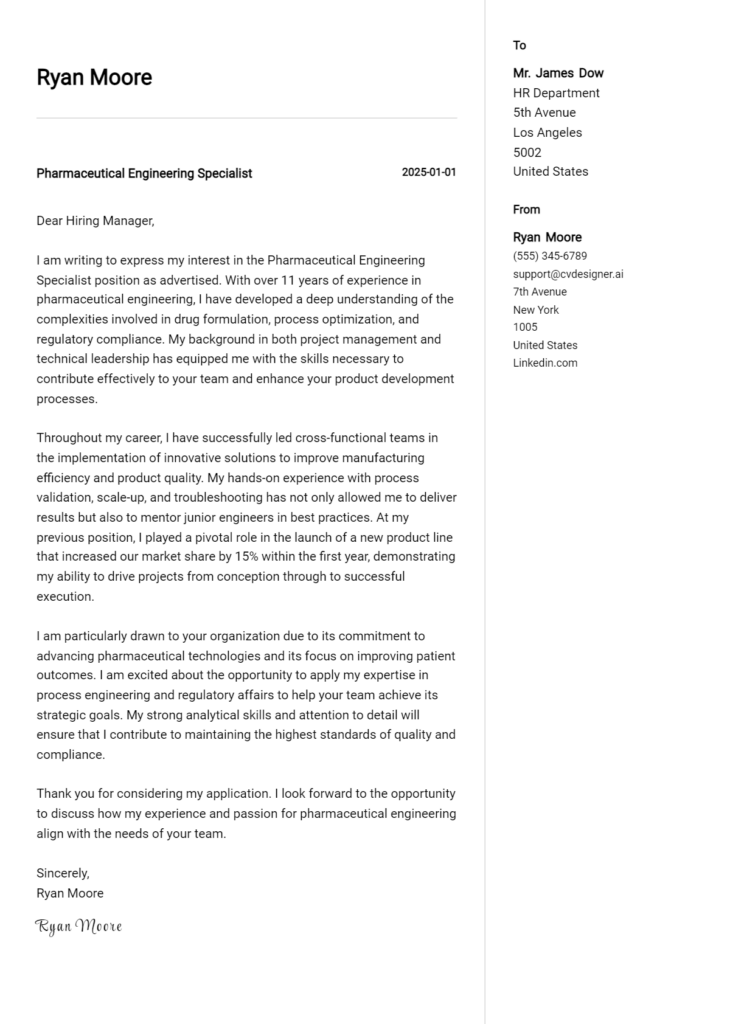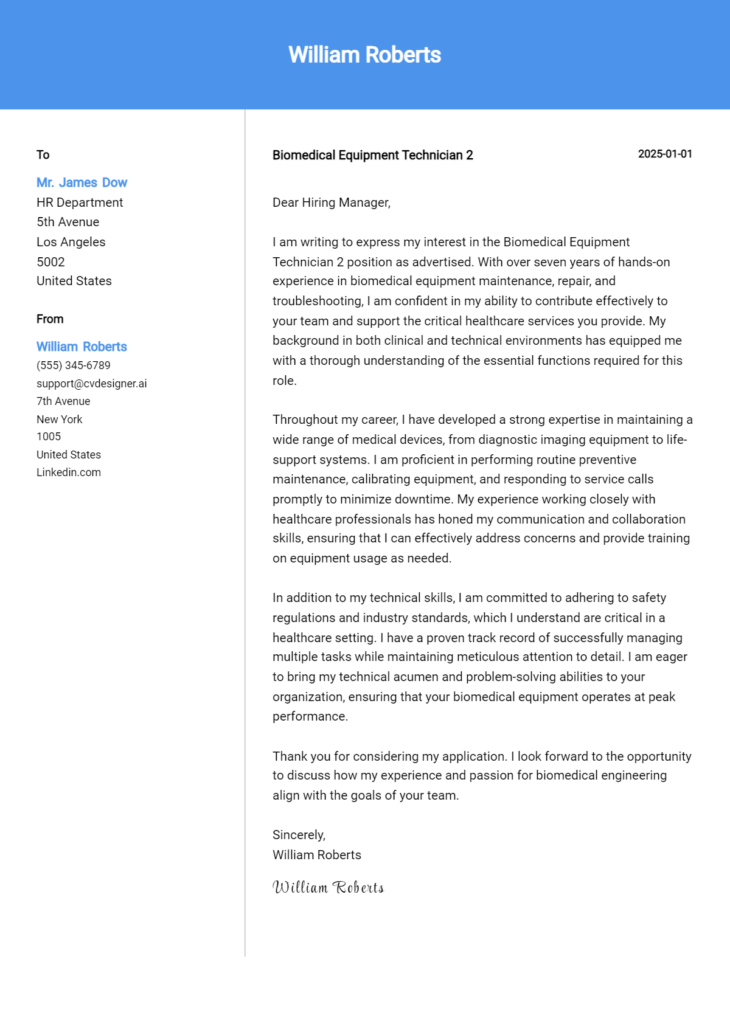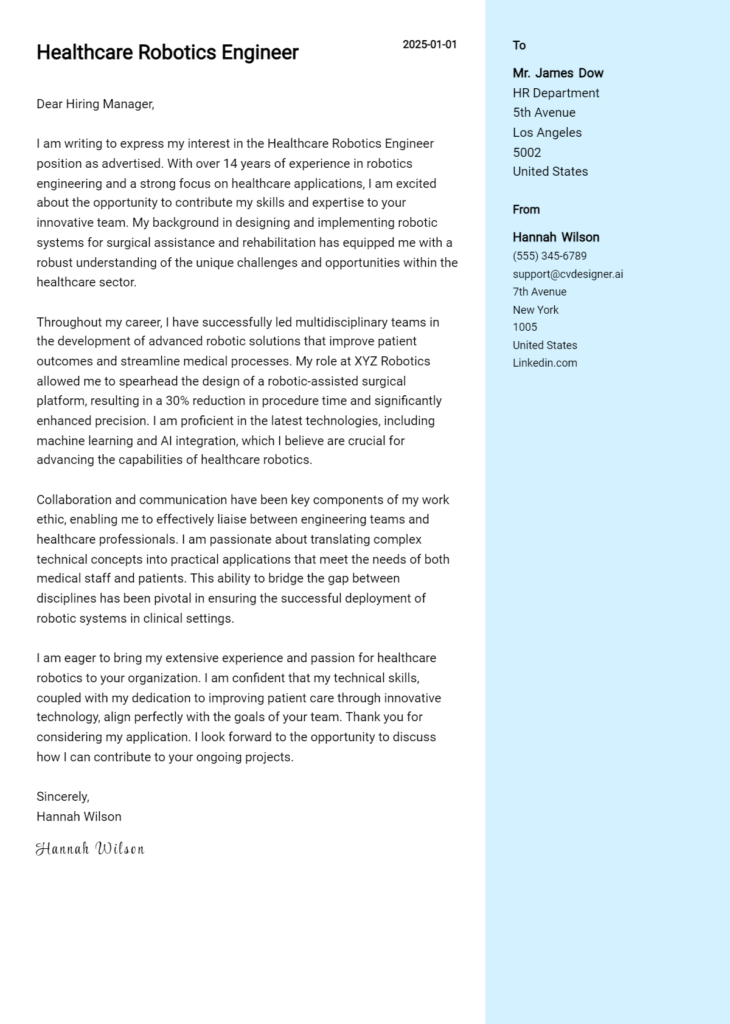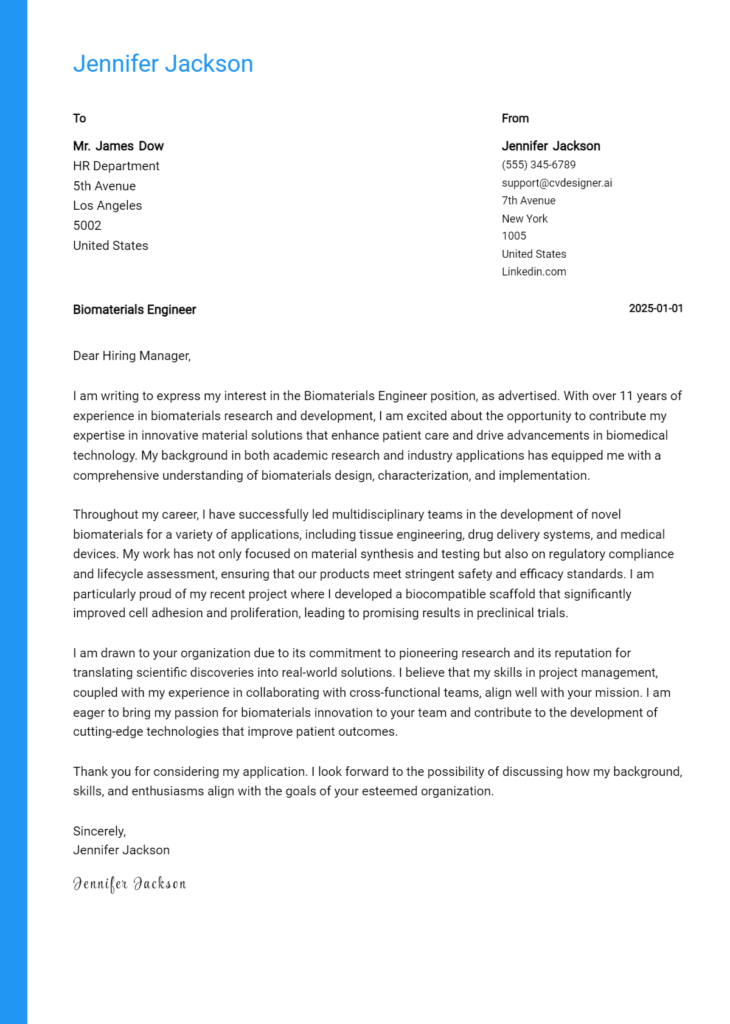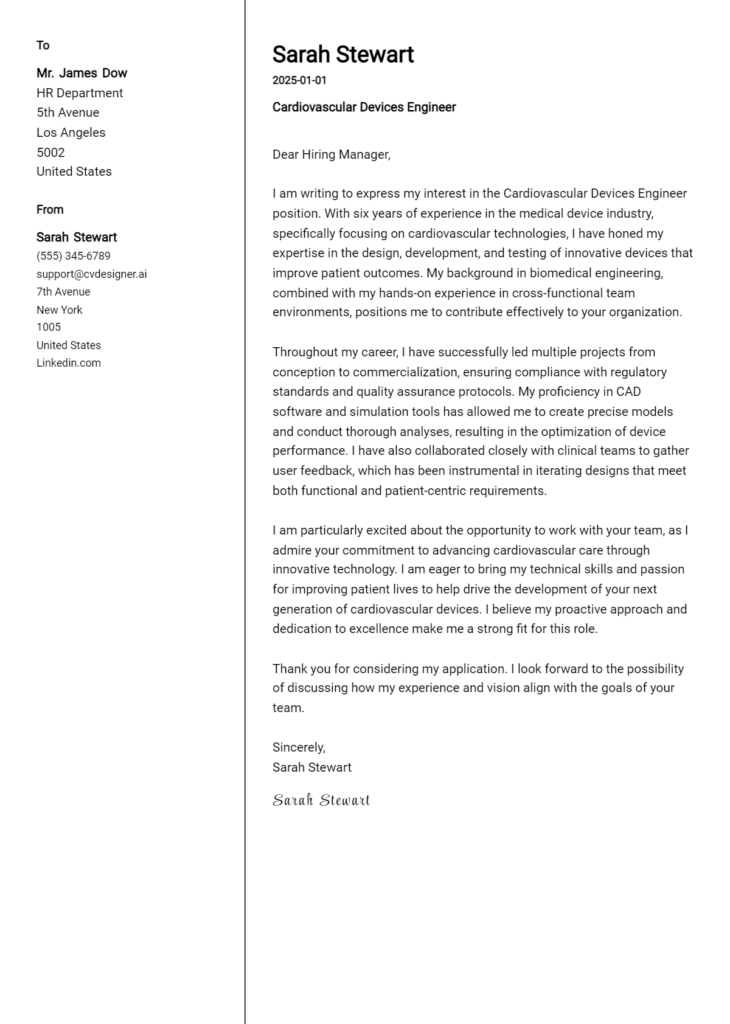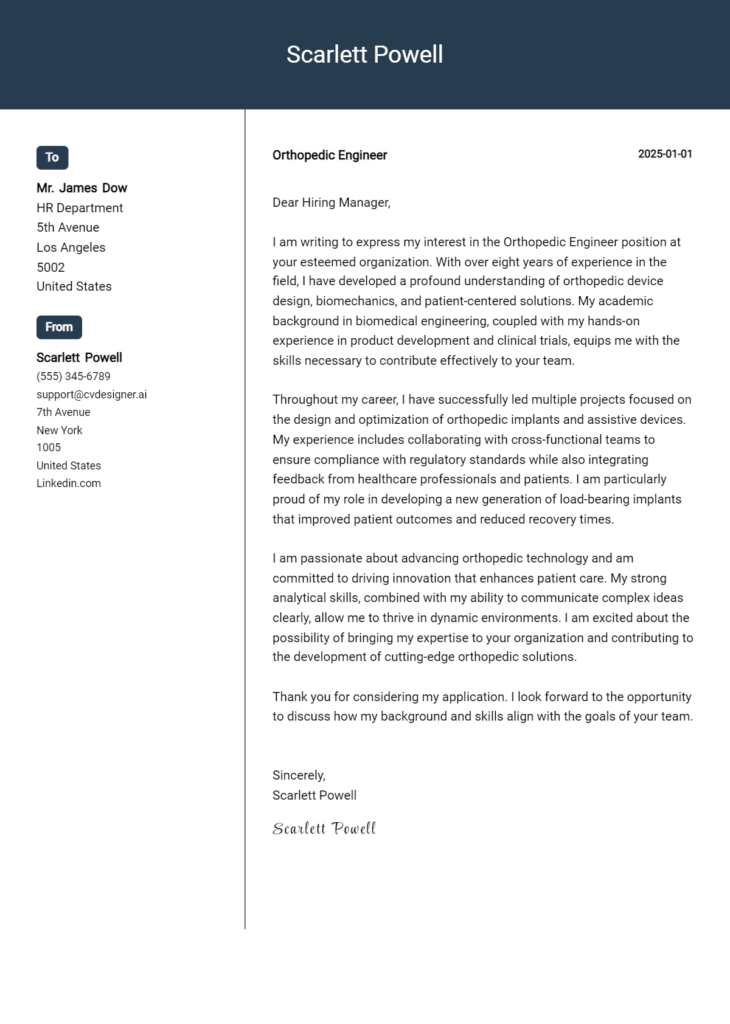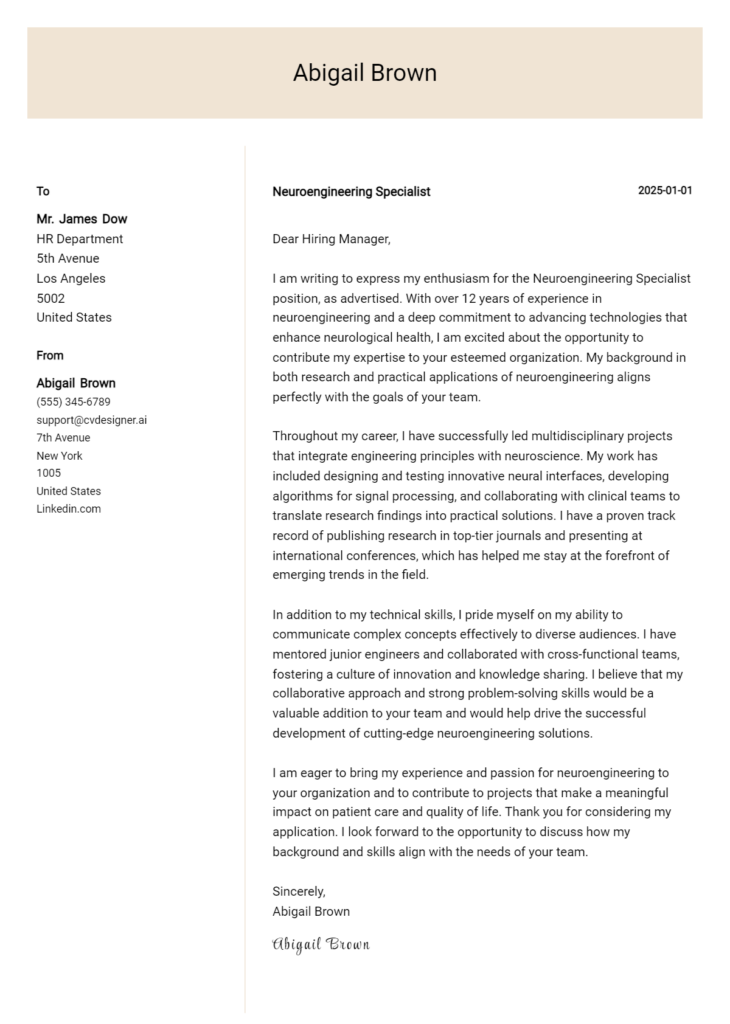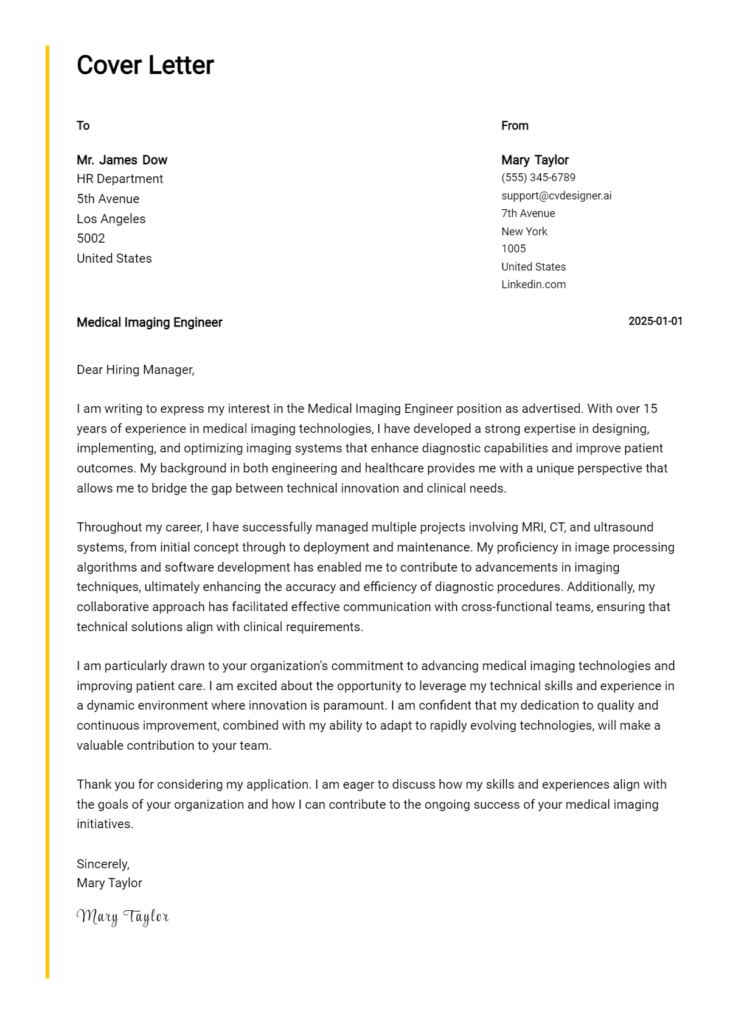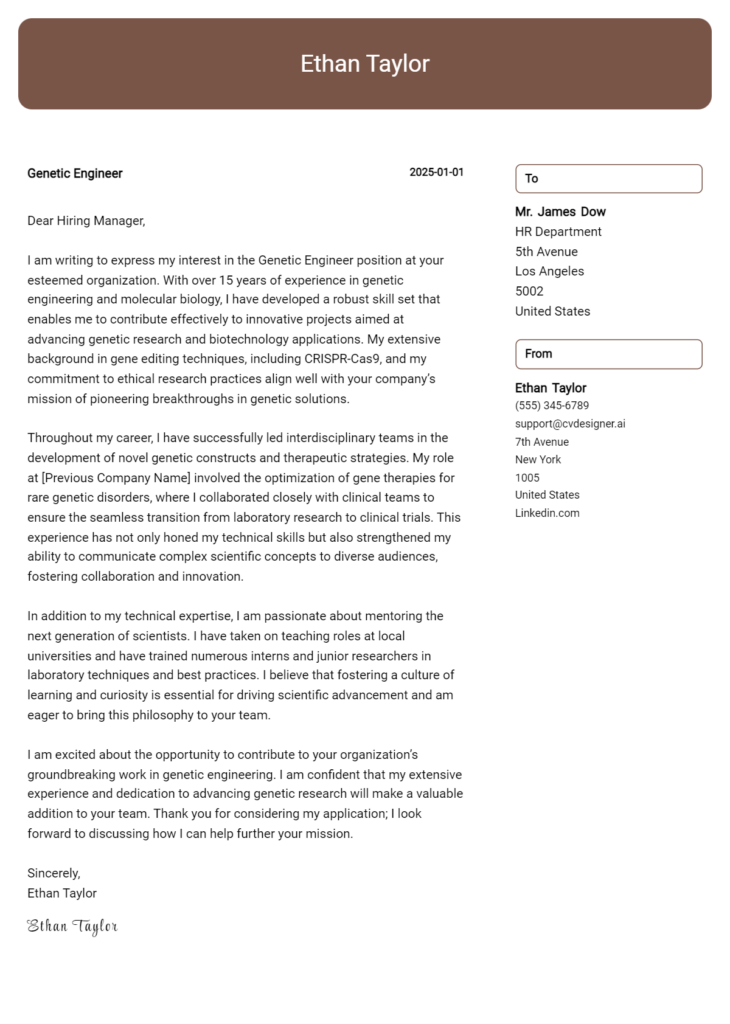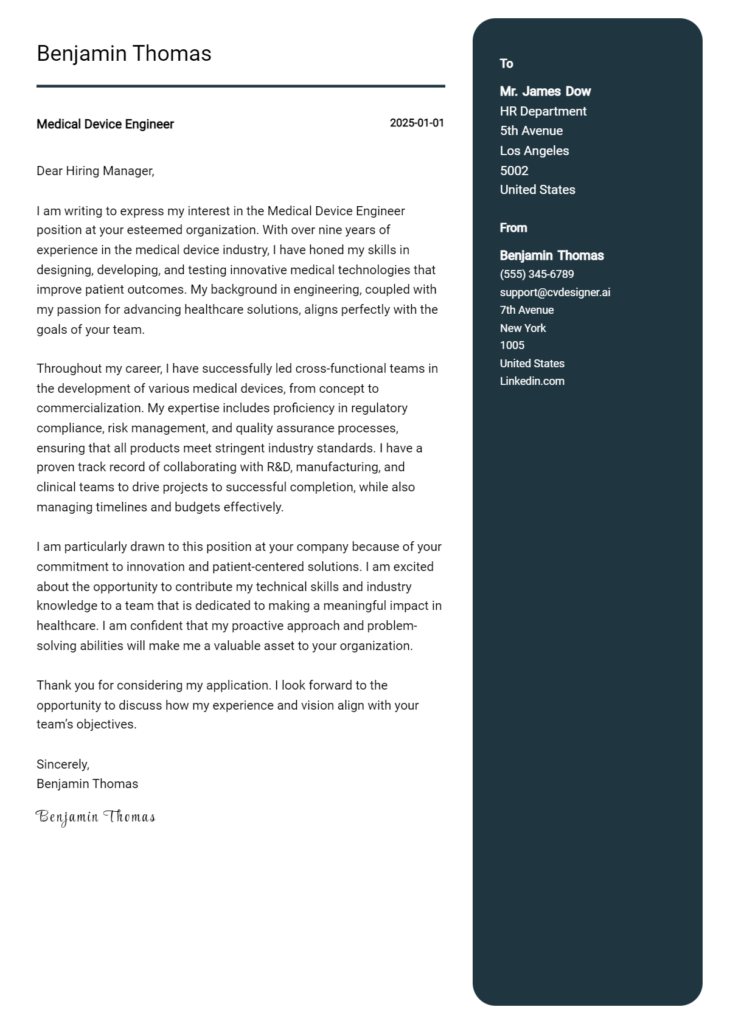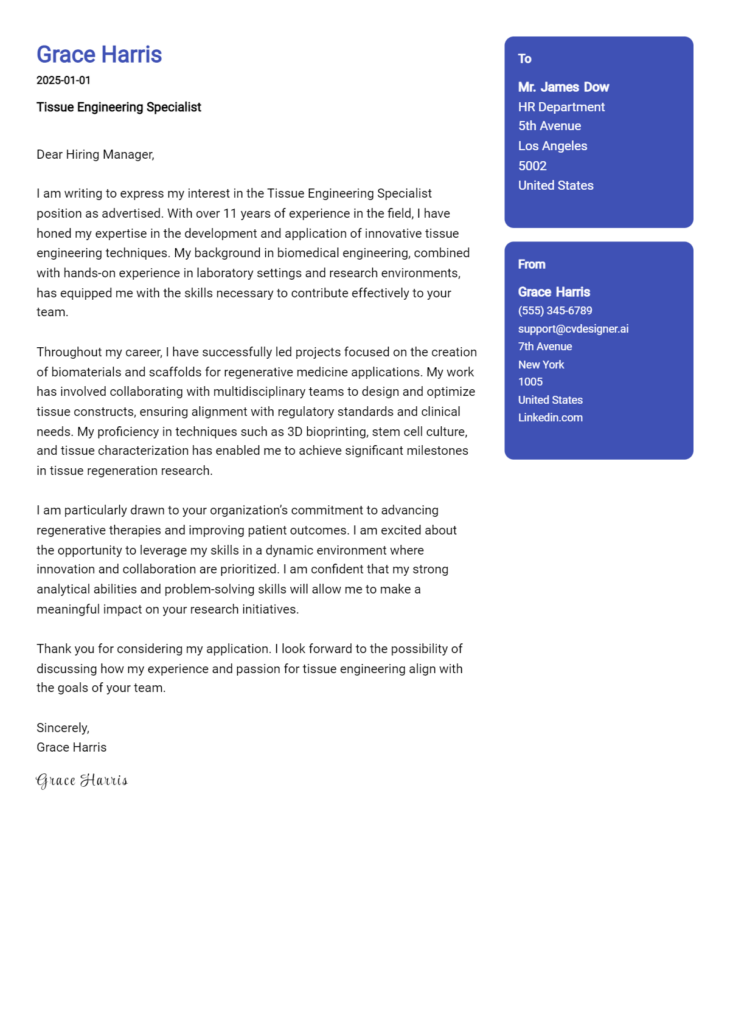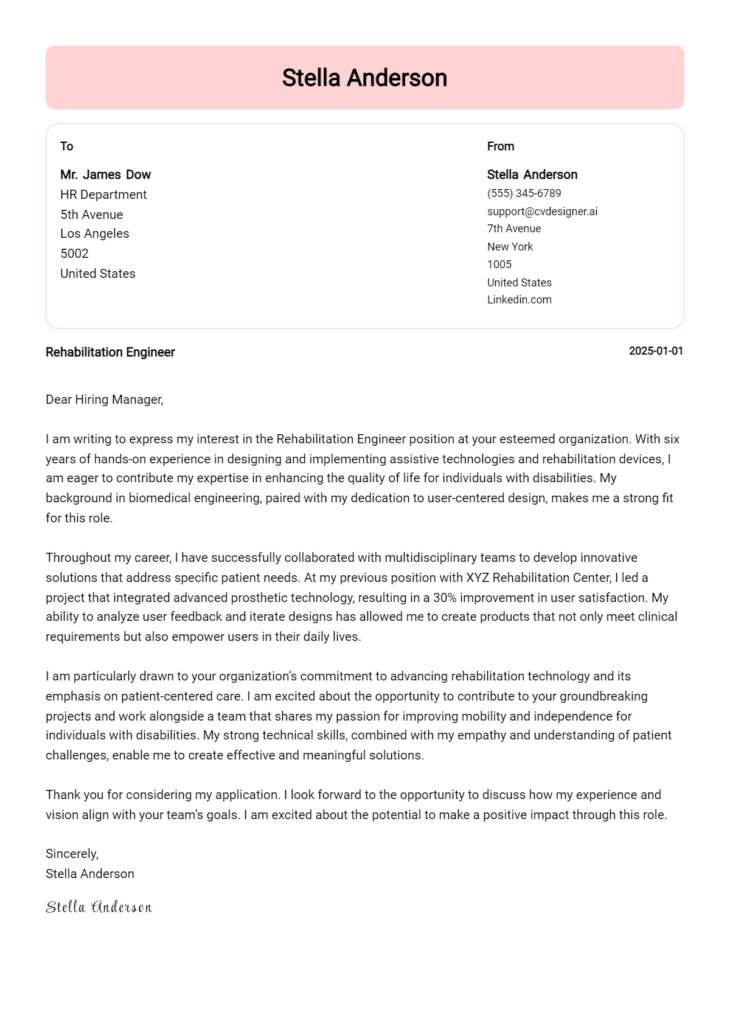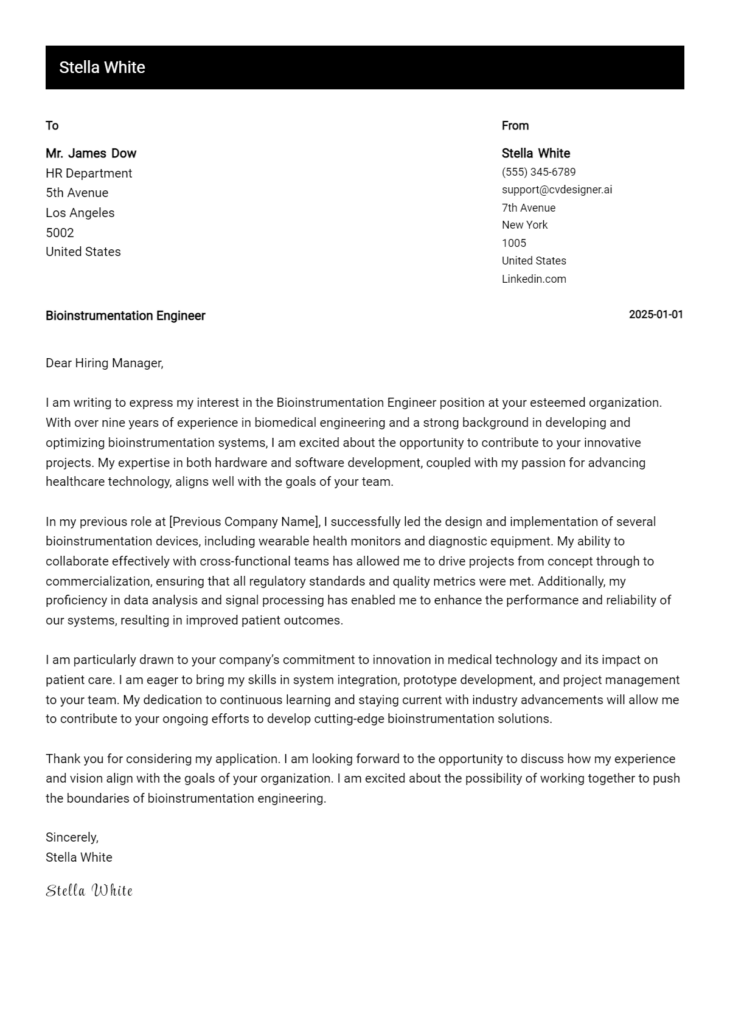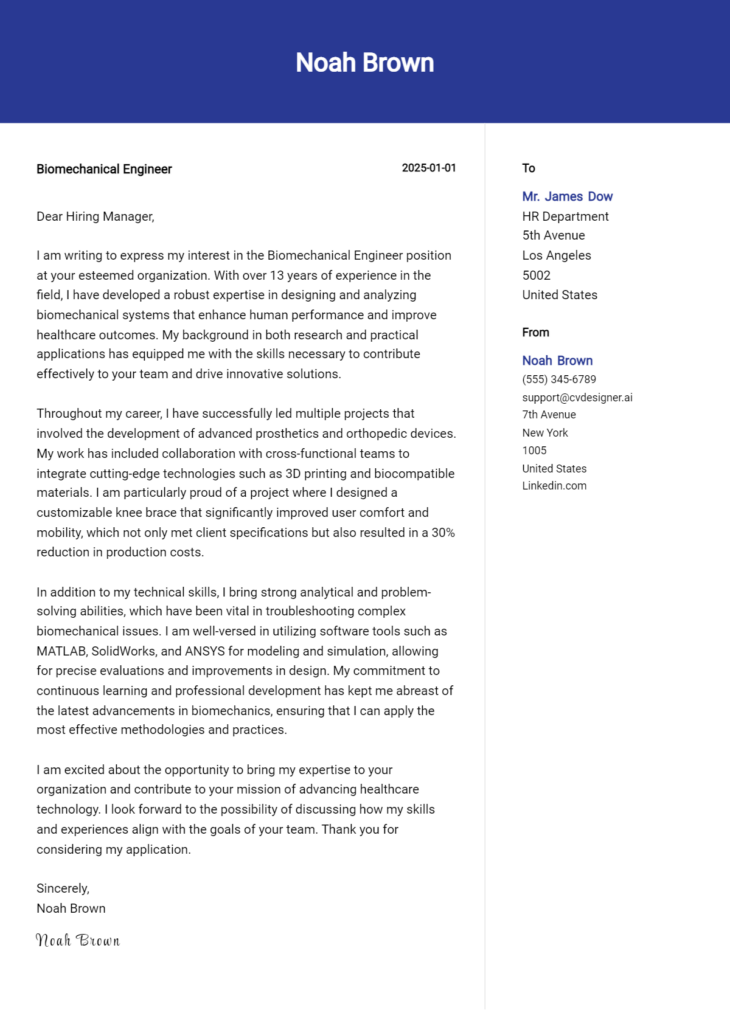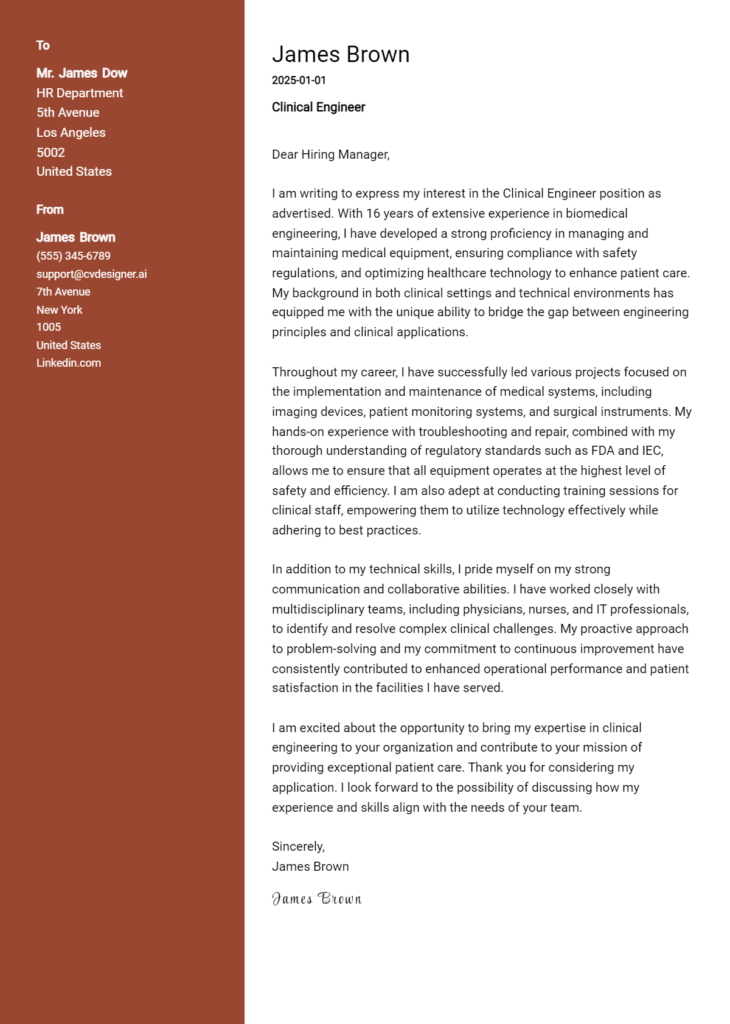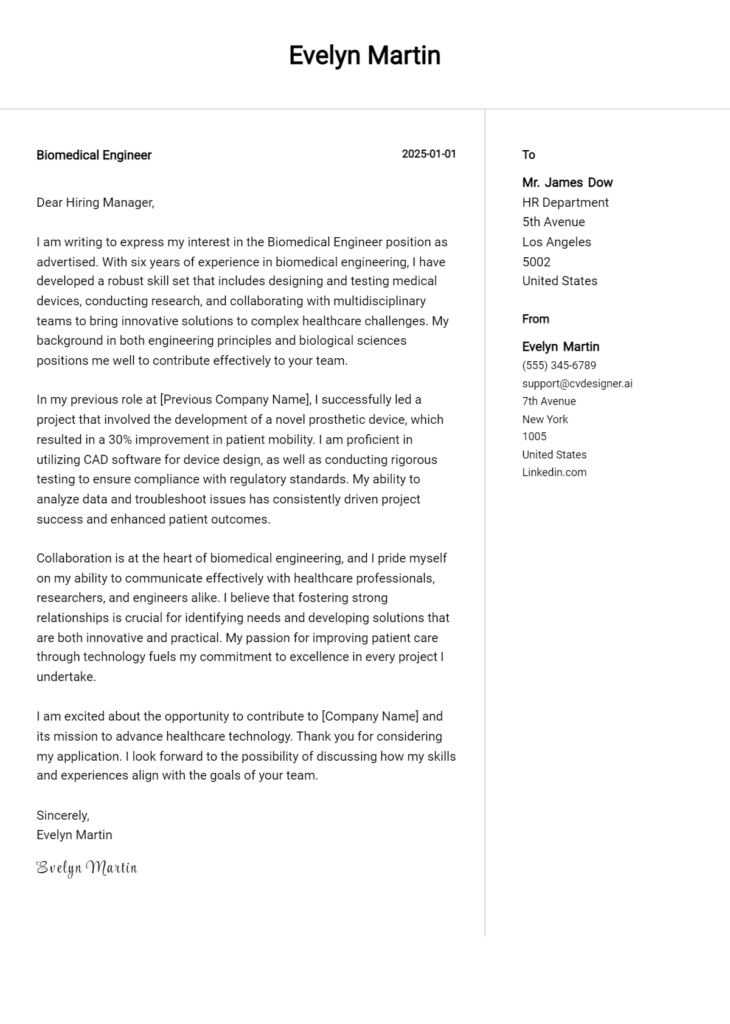Pharmaceutical Engineering Specialist 2 Cover Letter Examples
Explore additional Pharmaceutical Engineering Specialist 2 cover letter samples and guides and see what works for your level of experience or role.
How to Format a Pharmaceutical Engineering Specialist Cover Letter?
Crafting a well-structured cover letter is essential for a Pharmaceutical Engineering Specialist, as it not only showcases your qualifications but also mirrors the meticulous nature of your work in the pharmaceutical industry. The way you format your cover letter can significantly impact the hiring manager’s perception of your attention to detail, problem-solving abilities, and technical knowledge—qualities that are indispensable in this field.
In this guide, we will delve into the key components of a professional cover letter tailored for a Pharmaceutical Engineering Specialist, providing insights and industry-specific examples to help you create an effective document.
We will focus on the essential components of a professional cover letter, including:
- Cover Letter Header
- Cover Letter Greeting
- Cover Letter Introduction
- Cover Letter Body
- Cover Letter Closing
Each section is crucial for highlighting your expertise and professionalism in the pharmaceutical engineering realm. Let’s break down each part and discuss how to elevate your cover letter to make a lasting impression.
Importance of the Cover Letter Header for a Pharmaceutical Engineering Specialist
The cover letter header is a crucial element of your application as a Pharmaceutical Engineering Specialist. It provides the first impression to potential employers, reflecting your professionalism and attention to detail. A well-structured header should include your contact information, the date, and the recipient's details. Clarity and professionalism in this section set the tone for the rest of your letter and make it easier for hiring managers to reach you.
Here are examples of a strong and weak cover letter header for this role:
Strong Example
John Doe 123 Pharmaceutical Lane Cityville, State, Zip Code john.doe@email.com (123) 456-7890 October 1, 2023 Dr. Jane Smith Hiring Manager Pharma Innovations Inc. 456 Industry Road Cityville, State, Zip Code
Weak Example
John D. Email: john.doe@email.com Date: 10/1/23 To Whom It May Concern
In the strong example, all relevant information is clearly presented and formatted in a professional manner, while the weak example lacks essential details and proper structure, which can detract from the overall effectiveness of the application.
The Importance of a Cover Letter Greeting
The greeting of your cover letter serves as the initial point of contact with the hiring manager and is crucial in setting the tone for the rest of your application. A well-crafted greeting demonstrates professionalism and personalization, showing that you have taken the time to address the recipient directly. This small detail can make a significant difference in how your application is perceived. To make a positive impact, avoid generic greetings such as "To Whom It May Concern." Instead, strive to research the hiring manager's name and title, which can often be found on the company's website or LinkedIn. This effort not only reflects your enthusiasm for the position but also your attention to detail.
Here are examples of strong and weak greetings for a Pharmaceutical Engineering Specialist cover letter:
Strong Greeting Example
Dear Dr. Jane Smith,
Weak Greeting Example
To Whom It May Concern,
The Importance of an Engaging Cover Letter Introduction for a Pharmaceutical Engineering Specialist
A well-crafted cover letter introduction is essential for a Pharmaceutical Engineering Specialist as it sets the tone for the entire application. An engaging introduction should not only capture the hiring manager's attention but also express the candidate’s genuine interest in the role. Additionally, it should briefly showcase key skills or achievements that align with the job requirements, making the candidate stand out in a competitive field. Below are examples of both strong and weak cover letter introductions to illustrate the difference.
Strong Example
Dear [Hiring Manager's Name], As a dedicated Pharmaceutical Engineering Specialist with over five years of experience in optimizing drug manufacturing processes and ensuring compliance with regulatory standards, I am excited to apply for the position at [Company Name]. My proven track record of implementing innovative solutions that enhance product quality and efficiency, coupled with my passion for advancing pharmaceutical technologies, makes me a perfect fit for your team. I am eager to contribute my expertise in process validation and quality assurance to help drive [Company Name]’s mission of delivering safe and effective therapies to patients.
Weak Example
To whom it may concern, I am writing to apply for the Pharmaceutical Engineering Specialist position. I have some experience in the field, and I think I would be good at the job. I have done some work related to pharmaceuticals, but I am not sure what else to say right now.
Purpose of the Cover Letter Body for a Pharmaceutical Engineering Specialist
The body of a cover letter for a Pharmaceutical Engineering Specialist serves as a crucial platform for candidates to articulate their technical skills, relevant experiences, and the unique value they bring to the prospective employer. This section should effectively highlight specific projects or accomplishments that demonstrate the candidate's expertise in pharmaceutical processes, regulatory compliance, and innovative problem-solving. By providing concrete examples of past successes, such as leading a successful drug formulation project or optimizing manufacturing processes, candidates can illustrate their potential contributions to the company and convey their passion for advancing pharmaceutical engineering.
Strong Example
As a Pharmaceutical Engineering Specialist at XYZ Corp, I led a cross-functional team in the successful redesign of our sterile manufacturing process, resulting in a 30% increase in production efficiency and a significant reduction in product defects. My involvement in the introduction of lean manufacturing principles not only streamlined operations but also saved the company $500,000 annually. Furthermore, I played a pivotal role in the submission of our new drug application to the FDA, guiding the team through rigorous regulatory requirements and ensuring compliance with industry standards. These experiences have equipped me with a robust understanding of both the technical and regulatory landscapes of pharmaceutical engineering, making me a valuable asset to your team.
Weak Example
I have experience in pharmaceutical engineering and I am interested in the position. I worked on some projects in my last job, but I can't remember all the details. I think I can help your company because I have a degree in engineering and I am a hard worker. I like to learn new things and I am looking for a good opportunity to grow in my career.
Importance of the Cover Letter Closing for a Pharmaceutical Engineering Specialist
The closing paragraph of a cover letter is crucial as it serves as the final opportunity to leave a lasting impression on the hiring manager. For a Pharmaceutical Engineering Specialist, this section should succinctly summarize key qualifications, reiterate enthusiasm for the position, and encourage the next steps, such as reviewing the resume or scheduling an interview. A strong closing can reinforce the candidate's fit for the role and express eagerness to contribute to the company's success, while a weak closing may come across as vague or unenthusiastic, potentially undermining the entire application.
Strong Example
Thank you for considering my application for the Pharmaceutical Engineering Specialist position. With a solid background in process optimization and regulatory compliance, I am excited about the opportunity to contribute to your team at [Company Name]. I believe that my skills and passion for pharmaceutical innovation align perfectly with your mission. I look forward to the possibility of discussing my application further and am eager to bring my expertise to [Company Name]. Please feel free to contact me at your convenience to schedule an interview.
Weak Example
I hope you look over my resume. I think I would be good for the Pharmaceutical Engineering Specialist job. Let me know if you want to talk.
These tips will assist candidates in crafting an effective cover letter for a Pharmaceutical Engineering Specialist position. In this competitive field, it is crucial to showcase not only your technical skills and problem-solving abilities but also your understanding of the Software Development Life Cycle (SDLC), your ability to work collaboratively within a team, and your commitment to continuous learning. A well-structured cover letter can set you apart from other applicants by highlighting your qualifications and enthusiasm for the role.
Tips for Writing a Cover Letter for a Pharmaceutical Engineering Specialist
Highlight Your Technical Skills
Begin your cover letter by emphasizing your technical expertise relevant to pharmaceutical engineering. Mention specific software or tools you are proficient in, such as CAD software, simulation tools, or laboratory equipment. This shows that you possess the practical skills necessary for the role and are prepared to contribute from day one.Demonstrate Problem-Solving Abilities
Use examples from your past experiences to illustrate your problem-solving capabilities. Discuss a particular challenge you faced in a project and the steps you took to overcome it. This not only showcases your analytical skills but also your ability to think critically under pressure, a vital trait for a Pharmaceutical Engineering Specialist.Showcase Your Knowledge of SDLC
If applicable, detail your understanding of the Software Development Life Cycle (SDLC) processes. Explain how you have applied these principles in previous projects, especially in terms of validation and compliance within the pharmaceutical industry. This demonstrates your awareness of industry standards and your commitment to quality assurance.Emphasize Teamwork and Collaboration
Pharmaceutical projects often require cross-functional collaboration. Highlight your experience working within a team, focusing on your ability to communicate effectively and work harmoniously with colleagues from diverse backgrounds. Sharing a success story where teamwork led to a positive outcome can effectively illustrate this point.Convey Your Passion for Continuous Learning
In an ever-evolving field like pharmaceutical engineering, staying updated with the latest advancements is essential. Mention any relevant certifications, additional training, or workshops you have attended. Express your enthusiasm for continuous professional development and how this commitment will benefit your future employer.
For additional resources, consider exploring cover letter templates or utilizing a cover letter builder to create a polished and professional cover letter tailored to your unique skills and experiences.
Common Mistakes to Avoid in a Pharmaceutical Engineering Specialist Cover Letter
Crafting an effective cover letter is essential for standing out in the competitive field of pharmaceutical engineering. Avoiding common mistakes can significantly enhance your chances of landing an interview. Here are some frequent pitfalls to watch out for:
Generic Content: Failing to tailor your cover letter to the specific job can make it seem insincere. Always customize your letter to reflect the job description and company values.
Too Much Technical Jargon: While technical skills are crucial, overloading your cover letter with jargon can confuse hiring managers. Aim for a balance by explaining complex terms in simpler language.
Neglecting Formatting: Poor formatting can detract from your message. Follow a professional cover letter format to ensure clarity and readability.
Repeating the Resume: Your cover letter should complement your resume, not reiterate it. Use this opportunity to highlight your unique experiences and skills.
Lack of Specific Examples: Vague statements about your skills may not convince employers of your qualifications. Provide specific examples of your achievements to demonstrate your expertise.
Ignoring Proofreading: Spelling and grammatical errors can tarnish your professionalism. Always proofread your letter or have someone else review it before submitting.
Not Including a Call to Action: Failing to express enthusiasm for the role or an eagerness for follow-up can leave your letter feeling incomplete. End with a strong call to action that invites further discussion.
By steering clear of these common mistakes and utilizing effective cover letter examples, you can create a compelling cover letter that captures the attention of hiring managers and showcases your qualifications as a Pharmaceutical Engineering Specialist.
Cover Letter FAQs for Pharmaceutical Engineering Specialist
What should I include in my cover letter for a Pharmaceutical Engineering Specialist position?
When drafting your cover letter, focus on highlighting your technical skills, relevant experience, and knowledge of pharmaceutical regulations. Start with a strong opening that specifies the position you’re applying for and express your enthusiasm for the role. Include specific examples of your experience with pharmaceutical processes, such as drug formulation, quality assurance, or regulatory compliance. Mention any relevant certifications or education that align with the job requirements. Additionally, showcase your ability to work collaboratively in multidisciplinary teams and your problem-solving skills, as these are vital in the pharmaceutical industry. Conclude with a call to action, expressing your desire for an interview to discuss your qualifications further.
How can I tailor my cover letter for a specific job posting?
To tailor your cover letter effectively, first analyze the job posting for keywords and phrases that highlight the skills and experiences the employer values most. Incorporate these keywords into your cover letter, demonstrating that you possess the qualifications they seek. Align your past experiences with the responsibilities outlined in the job description; for instance, if the position emphasizes experience with Good Manufacturing Practices (GMP), detail your knowledge and application of GMP in previous roles. Additionally, reference the company's mission and values to show your interest in their specific work culture. Customizing your cover letter helps create a connection between your background and the employer's needs, making you a more appealing candidate.
How long should my cover letter be for a Pharmaceutical Engineering Specialist position?
A cover letter for a Pharmaceutical Engineering Specialist position should ideally be one page in length, typically comprising three to four paragraphs. This length allows you to provide a succinct overview of your qualifications without overwhelming the reader. Start with an engaging introduction, followed by a body that elaborates on your relevant experiences and skills. Aim for clarity and conciseness; each paragraph should serve a distinct purpose, whether it’s showcasing technical skills, relevant achievements, or demonstrating your fit for the company culture. Avoid unnecessary jargon or overly complex sentences. Ending with a strong conclusion that reiterates your interest in the position and a polite request for an interview will leave a lasting impression.
Should I include specific projects I’ve worked on in my cover letter?
Absolutely! Including specific projects showcases your hands-on experience and allows you to demonstrate your competencies in real-world scenarios. When discussing projects, focus on those most relevant to the position you are applying for. Highlight your role in the project, the challenges you faced, and the outcomes you achieved. For instance, if you led a project that improved drug stability or compliance with regulatory standards, detail your contributions and the impact on the organization. Quantifying your achievements (e.g., “reduced production time by 20%” or “improved product yield by 15%”) adds credibility to your claims. This approach not only helps differentiate you from other candidates but also provides tangible evidence of your skills and expertise in pharmaceutical engineering.
Build your Cover Letter in minutes
Use an AI-powered cover letter builder and have your letter done in 5 minutes. Just select your template and our software will guide you through the process.

